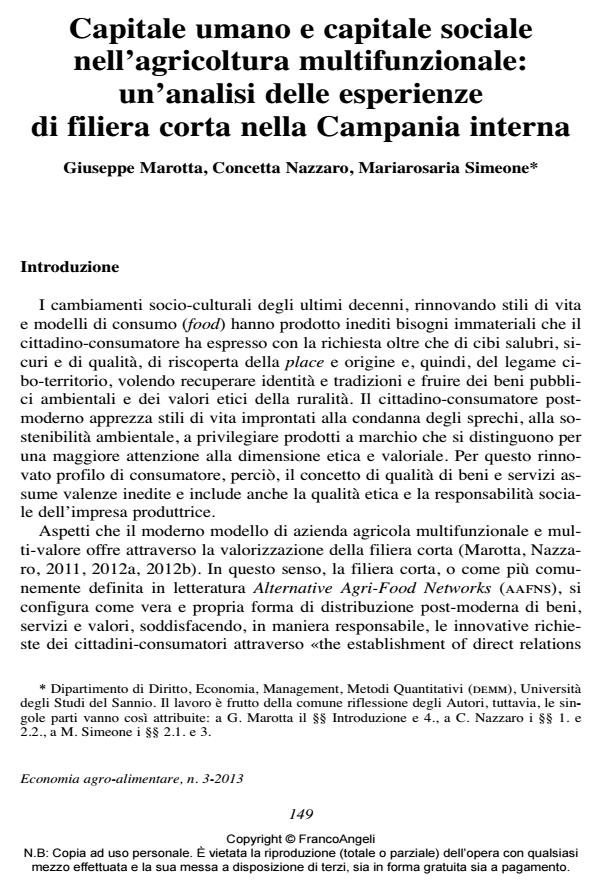Human capital and social capital in the multifunctional agriculture: an analysis of the short supply chain experiences in the inland of Campania
Journal title ECONOMIA AGRO-ALIMENTARE
Author/s Giuseppe Marotta, Concetta Nazzaro, Mariarosaria Simeone
Publishing Year 2014 Issue 2013/3
Language Italian Pages 25 P. 149-173 File size 470 KB
DOI 10.3280/ECAG2013-003009
DOI is like a bar code for intellectual property: to have more infomation
click here
Below, you can see the article first page
If you want to buy this article in PDF format, you can do it, following the instructions to buy download credits

FrancoAngeli is member of Publishers International Linking Association, Inc (PILA), a not-for-profit association which run the CrossRef service enabling links to and from online scholarly content.
The attention to business networks, therefore to the business relationships among companies, supply chain operators, manufacturers and consumers, aimed at commercial transactions, exchange of information, sharing of norms and associations of resources become an asset in the definition of modern strategies of competitive advantage for agribusiness companies. In this perspective, the short chain represents an interesting business model network, rooted in the specific territorial context, which, through specific organizational characteristics and diversified multi-functional activities, is enhanced by human and social resources, internal and external (at the company), and able to act on the local aggregation process and territorial value creation. Share capital and human capital become, therefore, the determining factors for the effectiveness of the short food supply chain experiences, especially in the inland areas, and for wider dissemination and sharing of the value created. Aim of this work is an analysis of the functional relationships between social capital and human capital in farms, diversified and multifunctional, which have taken paths of short chain. For this purpose, the empirical verification aimed to investigate how the quality of human capital affects the effectiveness of relational networks and how it could lead to have impacts on the performance of short chain, improving its ability to create value for the enterprise and for the territory. The results of the study made possible to understand the mechanisms and the strategic variables of this innovative mode of direct governance of transactions between producer and consumer-citizen, in specific territorial rural systems, and to indicate useful policy implications.
Keywords: Multifunctionality, short-wine supply chain, human capital, social capital, value creation
Jel codes: Q12, Q13, Q18, Q19, Q56
- It's a jungle out there - the strange animals of economic organization in agri-food value chains C. Nazzaro, G. Marotta, M. Stanco, pp.337 (ISBN:9789086868445)
- Short Food Supply Chain and Resilience: An Analysis during COVID-19 Pandemic in Inner Areas of Campania Region Anna Uliano, Marcello Stanco, Concetta Nazzaro, in Sustainability /2023 pp.12721
DOI: 10.3390/su151712721 - Which Stakeholders’ Sector Matters in Rural Development? That Is the Problem Tomasz Kusio, Mariantonietta Fiore, in Energies /2022 pp.454
DOI: 10.3390/en15020454 - Agrarian landscapes: from marginal areas to cultural landscapes—paths to sustainable tourism in small villages—the case of Vico Del Gargano in the club of the Borghi più belli d’Italia Simona Giordano, in Quality & Quantity /2020 pp.1725
DOI: 10.1007/s11135-019-00939-w
Giuseppe Marotta, Concetta Nazzaro, Mariarosaria Simeone, Capitale umano e capitale sociale nell’agricoltura multifunzionale: un’analisi delle esperienze di filiera corta nella Campania interna in "ECONOMIA AGRO-ALIMENTARE" 3/2013, pp 149-173, DOI: 10.3280/ECAG2013-003009